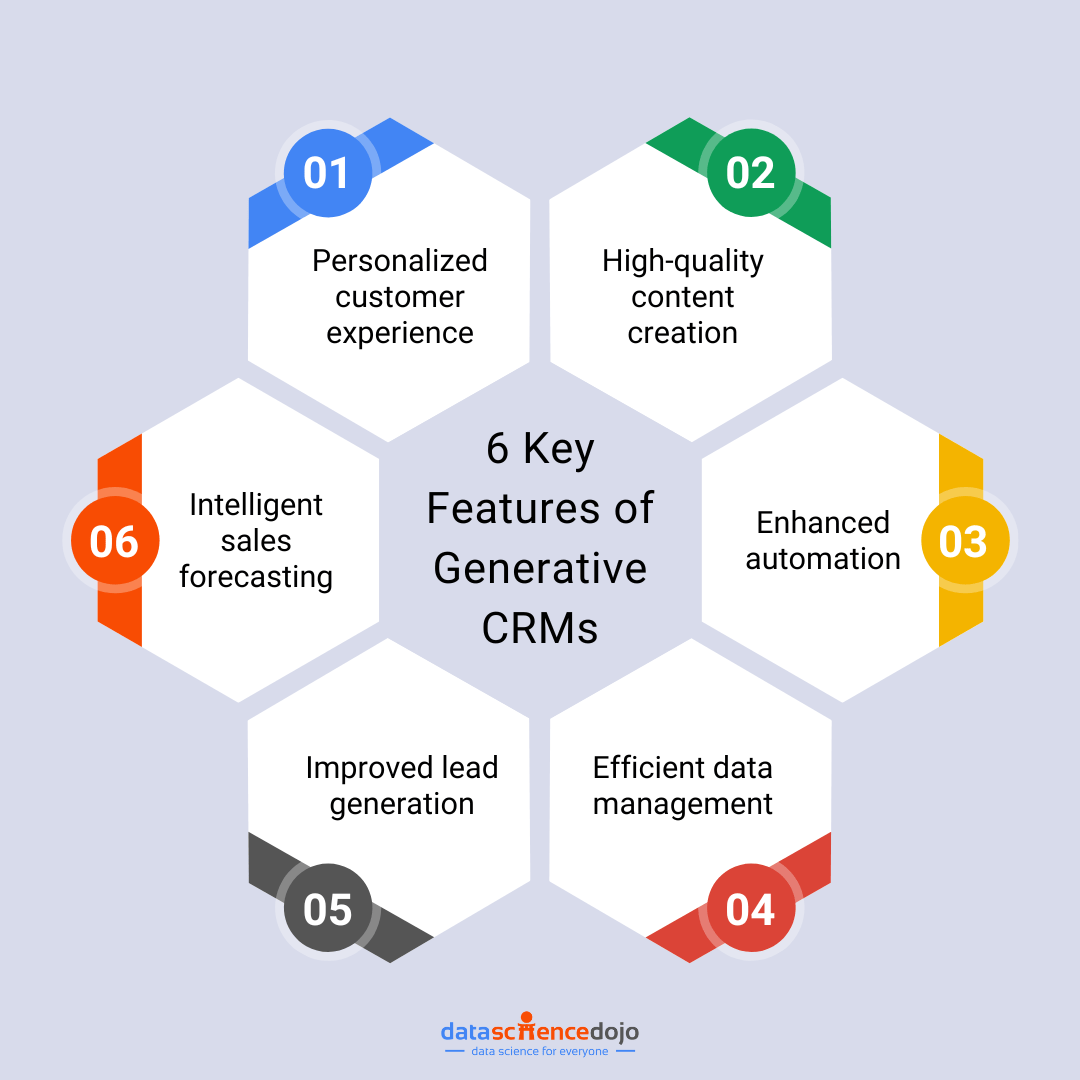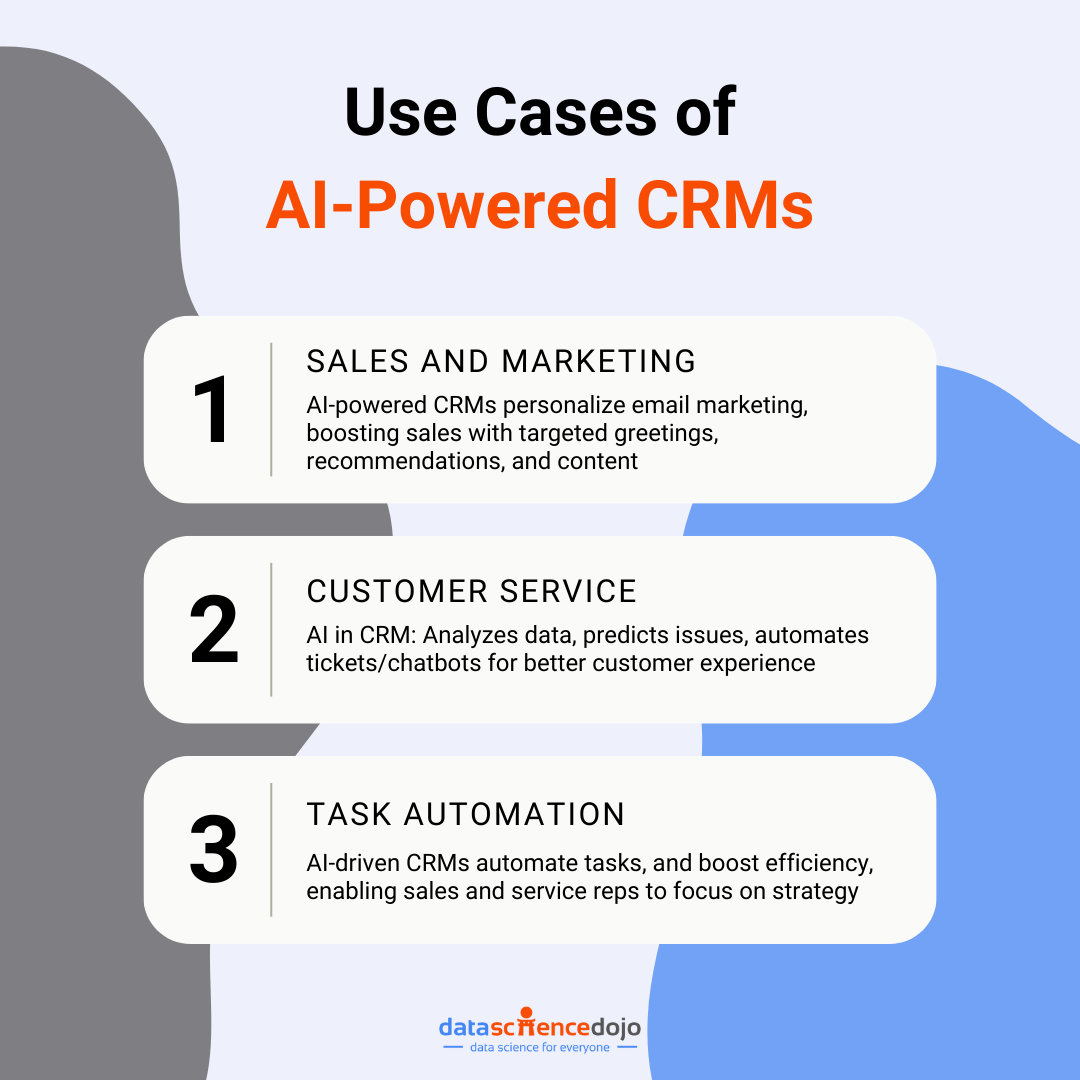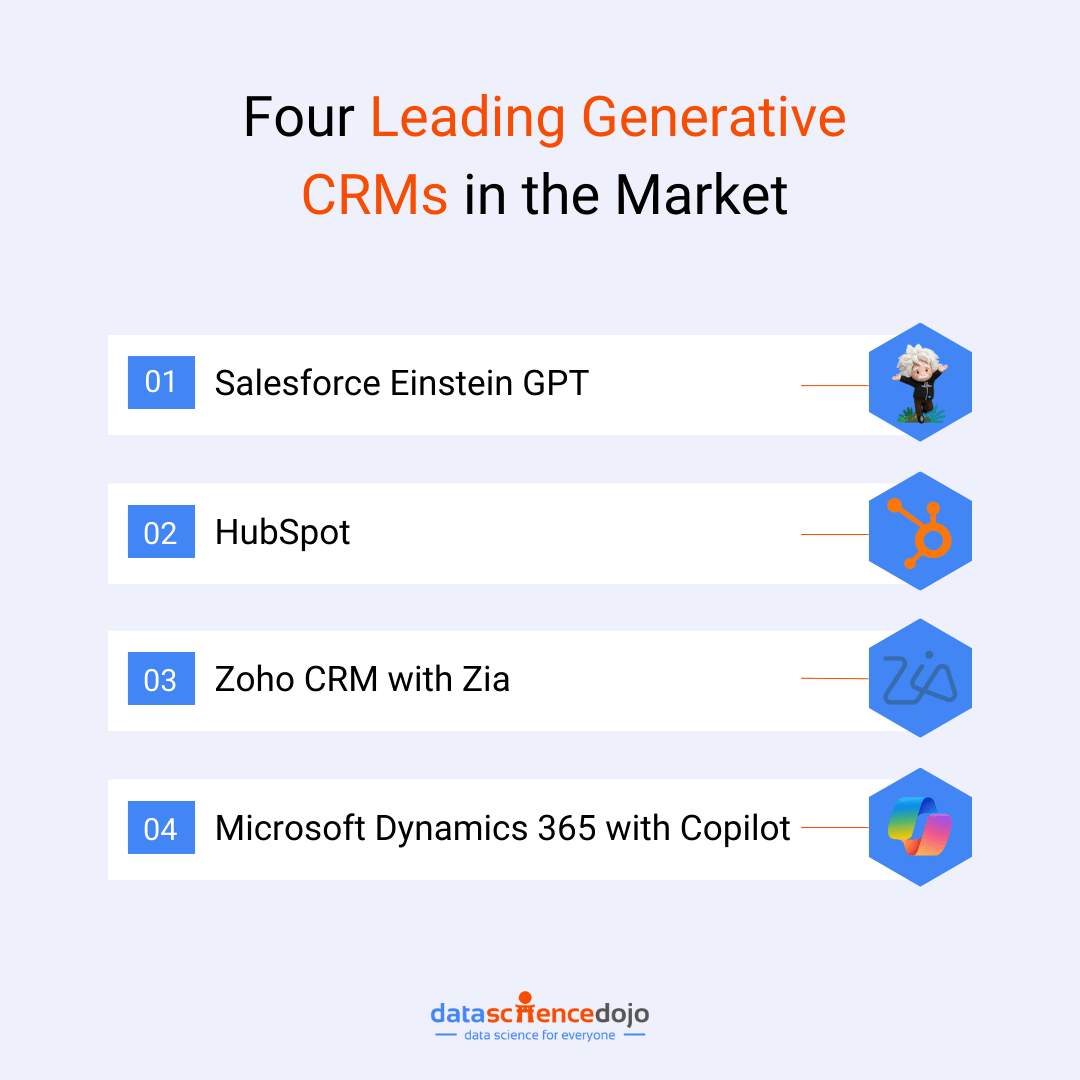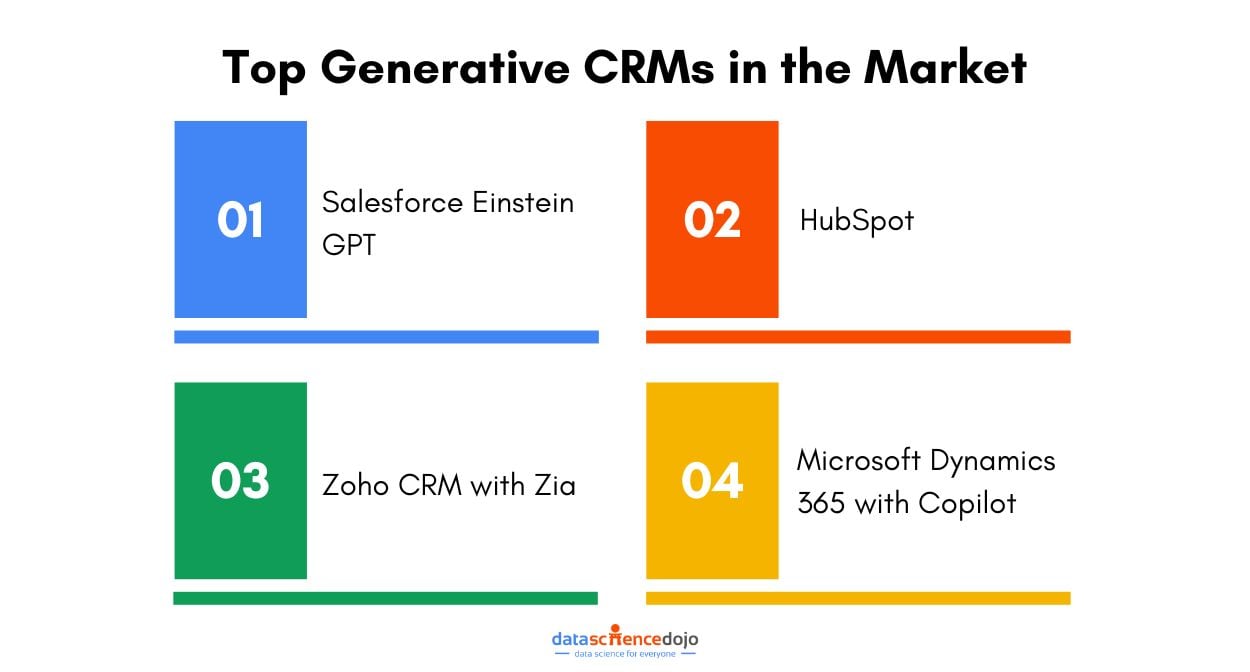Customer relationship management or CRM refers to a system that manages all customer interactions for any business. A CRM system enables enterprises to automate tasks for better workflows and provide useful customer insights.
Explore AI-powered marketing to revolutionize customer engagement
Hence, it is a data-driven system that improves customer service and ensures a personalized engagement experience for customers. A process that has potential for improvement with the introduction of generative AI.
In the CRM landscape, AI holds immense potential to revolutionize how businesses manage customer relationships. In this blog, we will explore the concept of AI-powered CRMs, navigating through the impact of integrating CRMs with generative AI features.
What are AI-powered CRMs?
Empower non-profit organizations through Generative AI and LLMs
It results in the development of intelligent systems that learn from data and recognize patterns to make informed decisions efficiently. Hence, enhancing the effectiveness of customer relationship management. Let’s take a look at some core functionalities associated with AI-powered CRMs.
Key Features of AI CRMs
Integrating generative AI into a CRM system transforms various aspects of customer relationship management. Some key functionalities of CRMs powered by AI are listed in this section.

Personalized customer engagement and experience
AI enables a CRM system to utilize machine learning (ML) and predictive analytics to closely analyze customer data. It ensures the creation of detailed insights into customer behavior and preferences. As a result, it ensures businesses understand their customers better and personalize their interactions.
Hence, an AI-powered CRM can create a hyper-personalized customer experience, ranging from tailored marketing campaigns and product recommendations to enhanced customer service responses. It enables personalization at a granular level, improving customer experience (CX) and fostering greater brand loyalty.
High-quality content creation
The role of generative AI as a powerful content assistant is well known. While creativity and innovation of content is a key function of AI, integrating this feature into a CRM system enables the use of these skills in generating relevant write-ups.
AI can assist CRM software in drafting emails, creating marketing materials, writing social media posts, and generating reports. With specific guidelines, this feature can ensure the generation of unique and relevant content for each category, reducing the manual effort required for these tasks.
Explore the top 8 AI tools to elevate your content strategy
Enhanced automation
Generative AI algorithms within CRM platforms identify potential bottlenecks, suggest process improvements, and refine strategies in real time. As a result, it enables businesses to operate at peak efficiency and proactively adapt to market changes.
This ensures improved automation, ensuring businesses can streamline their workflows efficiently. Hence, repetitive tasks can be automated to save time and resources, enabling individuals to focus on strategic planning for their businesses.
For instance, AI can automate the customer service process. It can ensure that responses to common customer queries and suggested replies are automatically generated for the users, enabling businesses to resolve customer issues more quickly.
Efficient data management
It is a direct result of improved automation with generative AI that increases accuracy and operational efficiency in the data collection process. For instance, auto-populating fields with relevant data reduced the manual input of adding information.
Moreover, AI-powered CRMs can automatically collect and organize vast amounts of data, including first-party data collection, which is crucial in the wake of declining third-party cookie acceptance.
Another important aspect of data management is the information analysis. By uncovering hidden patterns, it empowers a CRM platform to provide a deeper understanding of a customer base. Thus, businesses can make better-informed decisions.
Read more about the power of data-driven marketing
Improved lead generation
Since CRMs are crucial to the marketing processes, lead generation, and conversion rates are crucial measures for its success. AI-powered CRMs are useful tools that can analyze data efficiently to predict the likely leads to convert, streamlining the lead qualification process.
Discover the Top 7 Generative AI courses offered online
Hence, businesses use these insights for more targeted engagement, subsequently raising their conversion rates. and optimizing the sales funnel.
Intelligent sales forecasting
CRM tools with generative AI analyze historical and current data to provide dynamic sales forecasts, allowing companies to adapt their strategies in response to market changes. It enables businesses to improve their planning and make decisions driven by data, ensuring their success in the continuously evolving market.
Understand how Generative AI is reshaping the future of work
Thus, a CRM with AI is powered by these exceptional features that contribute to the success of businesses significantly. It makes the duo of CRM and AI a popular prospect. Let’s dig deeper into particular uses for an AI-powered CRM.
Use Cases for Generative AI in CRMs
Since the combination of artificial intelligence and CRMs has redefined business processes, the duo has multiple use cases to showcase its unique features.

Let’s explore some of the leading use cases of AI-powered CRMs in transforming customer experience.
Sales and Marketing
Since customer relationship management is a fundamental aspect of marketing, AI-powered CRMs have a crucial role to play in the field. With the power of generative AI, a CRM platform is enabled to execute personalized email marketing efficiently.
Learn Generative AI roadmap
Some key aspects of it include personalized greetings, product recommendations based on purchase history, and even compelling email copying that drives conversions. AI empowers CRM software to identify high-potential leads, nurture them, and guide them through the sales funnel.
Moreover, a combination of CRM with AI results in dynamic content creation, like tailoring product descriptions to individual customer preferences. It leads to more engagement and personalized experience for each customer, boosting sales for a business.
Here’s a playlist to explore if you are a beginner in understanding marketing analytics.
Customer Service
As CRM efficiency relies on timely and effective data management and processing, integrating it with AI only enhances the process. It enables a CRM platform to analyze customer data and identify potential issues, ensuring a proactive outreach from businesses to provide relevant solutions.
It also enhances customer experience through AI chatbots that carry out real-time interactions with customers. Hence, businesses can ensure a more satisfying customer interaction. Moreover, automation with AI-powered CRMs also increases the efficiency and accuracy of ticketing and routing.
Task Automation
Automation is a major aspect of AI-powered CRMs, freeing up salespeople and customer service reps to focus on strategic work, not data drudgery. Hence, automated processes improve the efficiency of customer relationship management.
Moreover, AI scheduling streamlines communication where you can generate automated email templates for scheduling meetings and sending personalized follow-up emails with key takeaways from the discussion. With less focus on these tasks, business personnel can focus their productivity on more strategic matters.
While you understand the power of bringing together CRM and AI, let’s take a closer look at some of the best generative CRMs for you to explore.
Impact of Generative AI on the CRM industry
The integration of CRM and AI is powered by multiple features as discussed above. It offers not only an upgrade but also transitions the entire process of customer relationship management.
Unlike traditional CRMs, an AI-powered CRM personalizes customer interaction. A generative CRM works by predicting their preferences, tailoring marketing campaigns as per user needs, and even generating real-time product recommendations based on customer behavior.
Thus, offering a hyper-personalized experience centered around the customer. This customer-centric approach fosters deeper connections, strengthens brand loyalty, and ultimately drives customer satisfaction.
Navigate through the trends of generative AI in marketing
Moreover, its strengths of automation, streamlining workflows, and data-driven decision-making also contribute to enhancing the overall user experience. A combination of all these features gives the CRM industry access to better insights that can be used for optimized operations.
Hence, generative AI unlocks the power of smarter decision-making for the CRM industry, and that too in real-time. However, when working with an AI-powered CRM, businesses must also carefully navigate through the associated ethical considerations like the bias of AI algorithms and the data privacy of their customers.
Thus, the CRM world of enhanced efficiency, deeper customer insights, and personalized experiences can only become a reality by addressing ethical considerations in the process. If executed properly, it boosts a shift toward a customer-centric approach, making it central to the success of businesses in the age of generative CRMs.
Top Generative CRMs in the Market
Here is a list of the top AI-powered CRMs in the market today.

Salesforce Einstein GPT
Built using OpenAI technology, it brings the power of secure and trustworthy generative AI to your CRM. It is designed to enhance the capabilities of CRM across various facets such as sales, marketing, service, and commerce by integrating generative AI with traditional CRM functionalities.
Salesforce Einstein GPT personalizes communication at scale, automates repetitive tasks, and uncovers hidden customer insights. It operates on real-time data and leverages insights generated from Salesforce’s Data Cloud while ensuring data privacy with its “Einstein GPT Trust Layer.”
The AI-powered CRM tool integrates easily with other Salesforce products, making it a valuable tool for their users to leverage AI within your CRM. Thus, it is a powerful tool for businesses to stay competitive in the digital age.
Learn more about the impact of AI-powered marketing on customer engagement
HubSpot
Its CRM software is designed to support inbound marketing, sales, and customer service. It provides tools and integrations for content management, social media marketing, search engine optimization, lead generation, customer support, and more.
The AI-powered CRM of HubSpot is a user-friendly tool including features like contact and deal management, company insights, email tracking and notifications, prospect tracking, meeting scheduling, and a live chat interface. With the integration of AI, it also becomes a smart writing assistant that suggests ideas and improves clarity
Zoho CRM with Zia
The Zoho CRM is powered by its built-in AI assistant called Zia. It is capable of suggesting personalized greetings, sharing product recommendations, and even crafting custom email templates. Hence, saving time while ensuring personalized communication for every customer.
Moreover, Zia also empowered Zoho with insightful takeaways from data. The AI assistant analyzes data extensively to generate clear summaries, enabling businesses to make informed decisions based on detailed customer insights. It boosts the overall efficiency of business operations.
Microsoft Dynamics 365 with Copilot
Copilot is a built-in AI assistant for the Microsoft Dynamics 365 CRM, helping define customer segments with natural language descriptions, saving time, and targeting your marketing efforts more effectively. It efficiently generates ideas, headlines, and marketing emails with personalized and creative content.
Moreover, it generates real-time insights from your data, suggesting appropriate results alongside. This AI-powered CRM integrates easily with Microsoft products, enabling you to leverage AI within your existing workflow.
While these are some of the major generative CRMs in the market today, you must consider your business’s specific needs and priorities when choosing the right tool. Factors like budget, the existing CRM landscape of your company, desired functionalities, and ease of use of a generative CRM must be considered when making your choice.
Future of Generative CRMs
Generative CRMs create a world of hyper-personalized customer interactions and data-driven decision-making, ensuring enhanced efficiency. Some of its key features include the automation of repetitive tasks and the generation of detailed insights to foster growth for businesses.
However, to fully utilize the potential of AI-powered CRMs, organizations must focus on data quality, user adoption, and ethical considerations to ensure data security. With the right approach, generative CRMs have the power to revolutionize customer relationship management for businesses.
Explore the Top 7 software development use cases of Generative AI
If you are ready to transition towards an integration of CRM and AI, start by researching the leading options we have discussed. Explore and understand as you take your first step towards a more intelligent and personalized approach to customer engagement.




